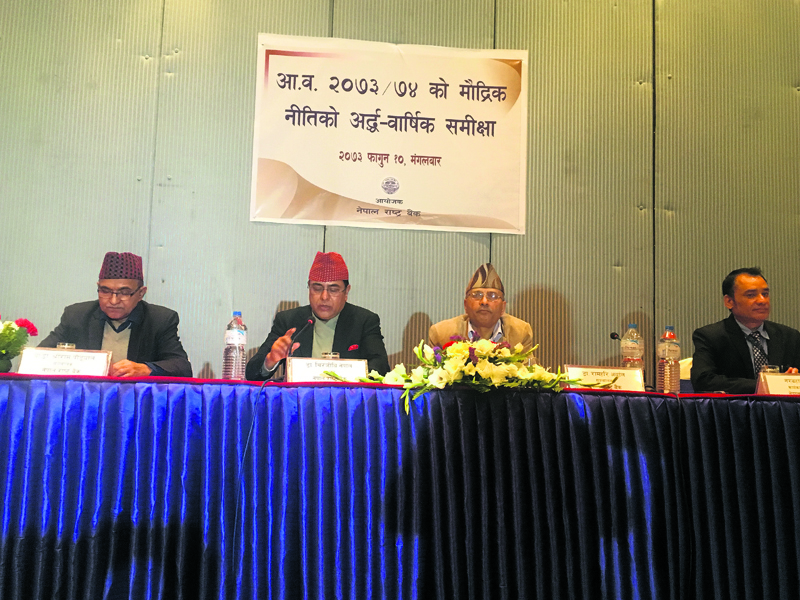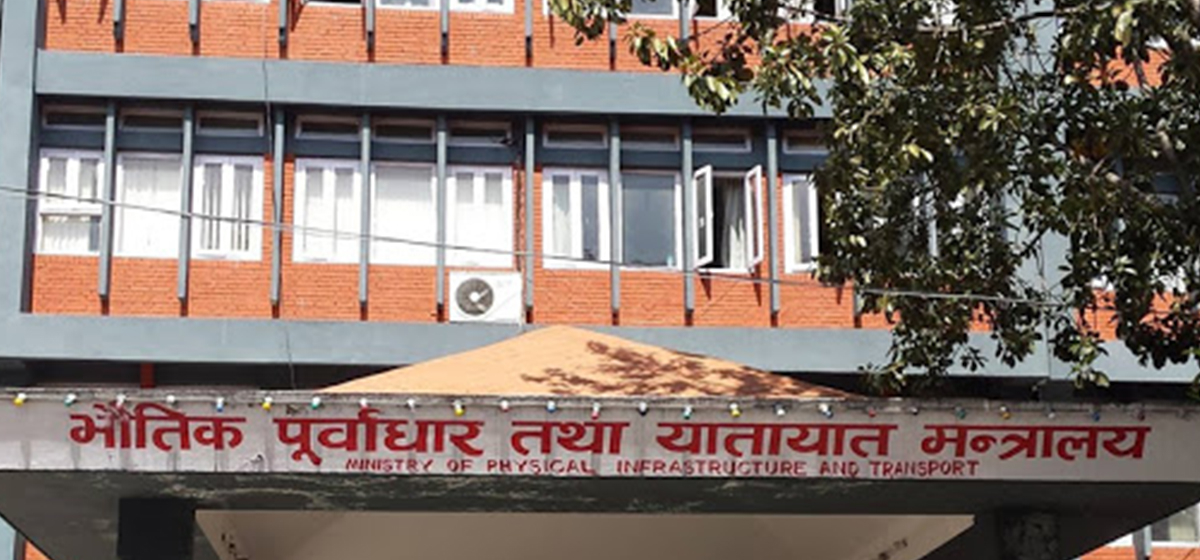
OR
Mid-term Review of Monetary Policy
NRB offers some relaxations to release funds for BFIs
Published On: February 22, 2017 10:18 AM NPT By: Sagar Ghimire | @sagarghi

HIGHLIGHTS:
-Deadline for requirement of 2 percent direct lending to deprived sector extended till mid-July 2018
-No changes in CRR, SLR requirements, and other bank rates
-Total domestic credit and private sector credit growth target unchanged at 25 percent and 20 percent, respectively
-Inflation to be contained at 7.5 percent, economic growth forecast of 6.5 percent
-Loan loss provisioning requirement if multiple banking borrowers of loans of and above Rs 1 billion not brought under consortium loans by mid-July
-100 percent loan loss provisioning requirement if loans acquired by submitting more than one financial report
KATHMANDU, Feb 22: As the banking industry grapples with the mismatch in deposit and credit growth that have causing shortage of lendable fund, the Nepal Rastra Bank has come up with some relaxations to the BFIs which will free up some funds for them to float as loans.
Unveiling the Mid-term Review of Monetary Policy for fiscal year 2016/17 on Tuesday, NRB Governor Chiranjibi Nepal said that the central bank would allow BFIs to reduce their direct lending to the deprived sector from their credit to core-capital-cum-deposit (CCD) ratio. Similarly, BFIs can now subtract 50 percent of their subsidized agro loans from the CCD ratio requirement.
According to Nar Bahadur Thapa, an executive director of the NRB, who also heads the Research Department, these relaxations amount to nearly Rs 127 billion which fund-starved BFIs can immediately extend as loans without counting it under the CCD ratio requirement.
The mandatory 80 percent CCD ratio requirement means that if a bank's total deposits and core capital amounts to Rs 100, it can only lend up to Rs 80 and maintain Rs 6 as cash reserves and Rs 8 in government securities investment, among others. As many banks have seen the ratio either breaching the limit or close to the upper limit, their lending capacity has been hit.
Overdraft limit slashed
Similarly, the NRB has also brought down the maximum limit of personal overdraft loans to Rs 7.5 million from existing Rs 10 million.
The central bank has given the BFIs until mid-July to bring down the limit to such ceiling on personal overdraft which has been already disbursed.
According to central bank officials, the new regulation is aimed at restricting misuse of the loans under this heading.
The personal overdraft loans allow a borrower to use loans on his/her own discretion. Most of the overdraft loans is said to be flowing toward stock market, real estate and other unproductive sectors.
Kishore Maharjan, vice president of Nepal Bankers' Association (NBA), however, says banks have already halted such lending in the wake of shortage of lendable funds.
With this decision to slash the upper limit of personal overdraft, the central bank expects that BFIs will have more funds at their disposal to lend in productive sectors.
Banks barred from offering higher rate on call deposit
The NRB has also announced that it would prohibit BFIs from offering interest rates on call deposit account higher than rates offered on saving deposit.
“To make interest rates on call deposit transparent and realistic, bank and financial institutions would not be allowed to provide interest rates on call deposit accounts higher than on saving deposits,” Governor Nepal said.
As of mid-December last year, the share of call deposits, saving deposits and fixed deposits remained 8.1 percent, 42.9 percent and 31.8 percent respectively.
While BFIs have been reluctant to raise saving deposit rates higher than 5 percent, they have been offering up to 10 percent interest on call deposits that is also known as 'overnight deposits' where depositors receives interest on day-to-day basis and have flexibility to withdraw anytime.
Institutional funds of insurance companies and cooperatives are the major sources of such demand deposits. Bankers have hailed the decision to enforce such restriction which they believe will reduce their cost of funds.
You May Like This

NRB announces additional benefits for banks that carry out joint operation by mid-July
KATHMANDU, June 6: Nepal Rastra Bank (NRB), in a bid to facilitate big mergers of commercial banks, has announced to provide... Read More...

NRB sets age bar for CEO, board directors of BFIs
KATHMANDU, Aug 6: Nepal Rastra Bank (NRB) has set age bar for chief executive officers (CEOs) and board directors of... Read More...

NRB allows BFIs to deduct subsidized loans in CCD ratio
KATHMANDU, Nov 29: Nepal Rastra Bank (NRB) has taken a flexible policy for commercial banks in terms of calculation of their... Read More...
Just In
- Over 16,000 paragliding flights conducted in one year in Pokhara
- MoPIT prepares draft of National Road Safety Act, proposes rescue within an hour of an accident
- Light rainfall likely in hilly areas of Koshi, Bagmati, Gandaki and Karnali provinces
- Customs revenue collection surpasses target at Tatopani border, Falls behind at Rasuwagadhi border in Q3
- Rain shocks: On the monsoon in 2024
- Govt receives 1,658 proposals for startup loans; Minimum of 50 points required for eligibility
- Unified Socialist leader Sodari appointed Sudurpaschim CM
- One Nepali dies in UAE flood


















Leave A Comment